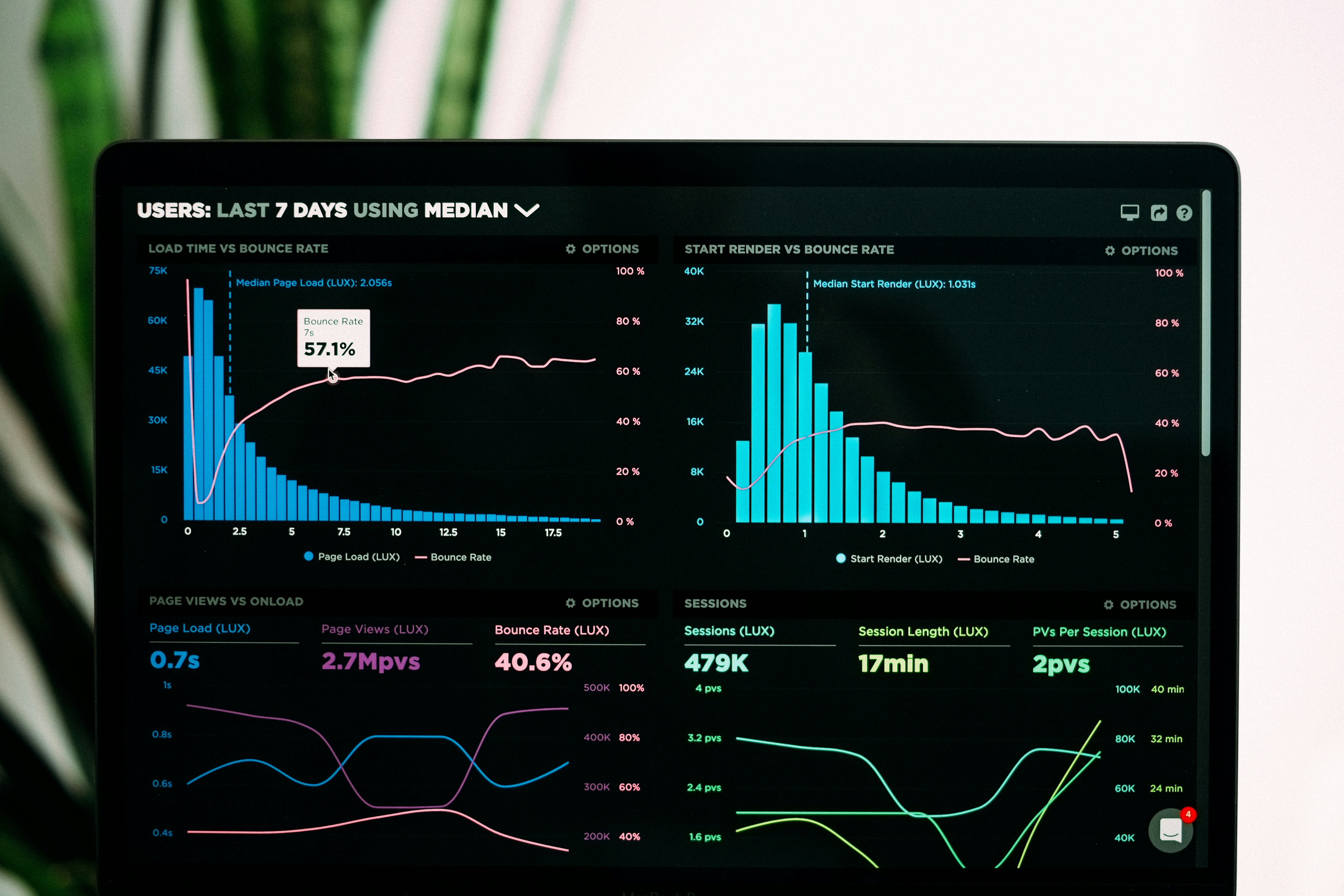
Blog
April 1, 2024
Using Data Analytics to Drive Business Decisions

Blog
April 1, 2024
Using Data Analytics to Drive Business Decisions
In an increasingly data-driven world, businesses of all sizes are harnessing the power of data analytics to inform their decision-making processes. By analyzing data, companies can gain valuable insights into customer behavior, market trends, and operational efficiency. In this blog post, we’ll explore how leveraging data analytics can enhance your business decisions and drive success.
In an increasingly data-driven world, businesses of all sizes are harnessing the power of data analytics to inform their decision-making processes. By analyzing data, companies can gain valuable insights into customer behavior, market trends, and operational efficiency. In this blog post, we’ll explore how leveraging data analytics can enhance your business decisions and drive success.
1. Understanding Data Analytics
Data analytics involves collecting, processing, and analyzing data to extract meaningful insights. These insights can range from customer preferences to operational bottlenecks. By understanding data analytics, businesses can make informed decisions based on evidence rather than intuition.
2. Identifying Key Performance Indicators (KPIs)
To effectively use data analytics, it’s essential to define key performance indicators (KPIs) that align with your business objectives. KPIs provide measurable values that reflect your organization’s performance. Common KPIs include sales growth, customer acquisition cost, and customer retention rate. By tracking these metrics, you can gauge your progress and identify areas for improvement.
3. Enhancing Customer Insights
Data analytics enables businesses to gain a deeper understanding of their customers. By analyzing customer behavior data, such as purchase history and online interactions, you can identify trends and preferences. This information allows you to tailor your products, services, and marketing efforts to meet customer needs, ultimately enhancing customer satisfaction and loyalty.
4. Optimizing Marketing Strategies
Data analytics is a game-changer for marketing strategies. By analyzing campaign performance data, you can determine which channels and messages resonate most with your audience. This allows you to allocate resources more effectively and refine your marketing approach for maximum impact. Additionally, A/B testing can help you identify the most effective ad creatives and messaging strategies.
5. Improving Operational Efficiency
Analyzing operational data can reveal inefficiencies and bottlenecks in your business processes. By identifying areas for improvement, you can streamline operations, reduce costs, and enhance productivity. For instance, data analytics can help optimize inventory management, supply chain logistics, and workforce allocation, leading to better resource utilization.
6. Making Informed Financial Decisions
Data analytics provides valuable insights into your financial performance. By analyzing financial data, such as revenue trends, expenses, and profit margins, you can make informed decisions about budgeting, pricing strategies, and investment opportunities. This data-driven approach minimizes risks and enhances financial planning.
7. Predicting Future Trends
One of the significant advantages of data analytics is its ability to predict future trends and behaviors. By leveraging historical data, businesses can forecast customer demands, market trends, and potential risks. This foresight allows you to proactively adjust your strategies and seize opportunities ahead of the competition.
8. Fostering a Data-Driven Culture
To maximize the benefits of data analytics, fostering a data-driven culture within your organization is crucial. Encourage employees at all levels to utilize data in their decision-making processes. Providing training and access to data tools empowers your team to make informed choices that align with your business objectives.
Conclusion
In today’s competitive landscape, leveraging data analytics is essential for making informed business decisions. By understanding and analyzing data, you can enhance customer insights, optimize marketing strategies, improve operational efficiency, and predict future trends. Embracing a data-driven approach can lead to increased profitability and long-term success.
At Display DM, we understand the importance of data analytics in driving business growth. If you’re ready to harness the power of data to inform your decisions, let’s connect and explore how we can support you!
1. Understanding Data Analytics
Data analytics involves collecting, processing, and analyzing data to extract meaningful insights. These insights can range from customer preferences to operational bottlenecks. By understanding data analytics, businesses can make informed decisions based on evidence rather than intuition.
2. Identifying Key Performance Indicators (KPIs)
To effectively use data analytics, it’s essential to define key performance indicators (KPIs) that align with your business objectives. KPIs provide measurable values that reflect your organization’s performance. Common KPIs include sales growth, customer acquisition cost, and customer retention rate. By tracking these metrics, you can gauge your progress and identify areas for improvement.
3. Enhancing Customer Insights
Data analytics enables businesses to gain a deeper understanding of their customers. By analyzing customer behavior data, such as purchase history and online interactions, you can identify trends and preferences. This information allows you to tailor your products, services, and marketing efforts to meet customer needs, ultimately enhancing customer satisfaction and loyalty.
4. Optimizing Marketing Strategies
Data analytics is a game-changer for marketing strategies. By analyzing campaign performance data, you can determine which channels and messages resonate most with your audience. This allows you to allocate resources more effectively and refine your marketing approach for maximum impact. Additionally, A/B testing can help you identify the most effective ad creatives and messaging strategies.
5. Improving Operational Efficiency
Analyzing operational data can reveal inefficiencies and bottlenecks in your business processes. By identifying areas for improvement, you can streamline operations, reduce costs, and enhance productivity. For instance, data analytics can help optimize inventory management, supply chain logistics, and workforce allocation, leading to better resource utilization.
6. Making Informed Financial Decisions
Data analytics provides valuable insights into your financial performance. By analyzing financial data, such as revenue trends, expenses, and profit margins, you can make informed decisions about budgeting, pricing strategies, and investment opportunities. This data-driven approach minimizes risks and enhances financial planning.
7. Predicting Future Trends
One of the significant advantages of data analytics is its ability to predict future trends and behaviors. By leveraging historical data, businesses can forecast customer demands, market trends, and potential risks. This foresight allows you to proactively adjust your strategies and seize opportunities ahead of the competition.
8. Fostering a Data-Driven Culture
To maximize the benefits of data analytics, fostering a data-driven culture within your organization is crucial. Encourage employees at all levels to utilize data in their decision-making processes. Providing training and access to data tools empowers your team to make informed choices that align with your business objectives.
Conclusion
In today’s competitive landscape, leveraging data analytics is essential for making informed business decisions. By understanding and analyzing data, you can enhance customer insights, optimize marketing strategies, improve operational efficiency, and predict future trends. Embracing a data-driven approach can lead to increased profitability and long-term success.
At Display DM, we understand the importance of data analytics in driving business growth. If you’re ready to harness the power of data to inform your decisions, let’s connect and explore how we can support you!


In an increasingly data-driven world, businesses of all sizes are harnessing the power of data analytics to inform their decision-making processes. By analyzing data, companies can gain valuable insights into customer behavior, market trends, and operational efficiency. In this blog post, we’ll explore how leveraging data analytics can enhance your business decisions and drive success.
1. Understanding Data Analytics
Data analytics involves collecting, processing, and analyzing data to extract meaningful insights. These insights can range from customer preferences to operational bottlenecks. By understanding data analytics, businesses can make informed decisions based on evidence rather than intuition.
2. Identifying Key Performance Indicators (KPIs)
To effectively use data analytics, it’s essential to define key performance indicators (KPIs) that align with your business objectives. KPIs provide measurable values that reflect your organization’s performance. Common KPIs include sales growth, customer acquisition cost, and customer retention rate. By tracking these metrics, you can gauge your progress and identify areas for improvement.
3. Enhancing Customer Insights
Data analytics enables businesses to gain a deeper understanding of their customers. By analyzing customer behavior data, such as purchase history and online interactions, you can identify trends and preferences. This information allows you to tailor your products, services, and marketing efforts to meet customer needs, ultimately enhancing customer satisfaction and loyalty.
4. Optimizing Marketing Strategies
Data analytics is a game-changer for marketing strategies. By analyzing campaign performance data, you can determine which channels and messages resonate most with your audience. This allows you to allocate resources more effectively and refine your marketing approach for maximum impact. Additionally, A/B testing can help you identify the most effective ad creatives and messaging strategies.
5. Improving Operational Efficiency
Analyzing operational data can reveal inefficiencies and bottlenecks in your business processes. By identifying areas for improvement, you can streamline operations, reduce costs, and enhance productivity. For instance, data analytics can help optimize inventory management, supply chain logistics, and workforce allocation, leading to better resource utilization.
6. Making Informed Financial Decisions
Data analytics provides valuable insights into your financial performance. By analyzing financial data, such as revenue trends, expenses, and profit margins, you can make informed decisions about budgeting, pricing strategies, and investment opportunities. This data-driven approach minimizes risks and enhances financial planning.
7. Predicting Future Trends
One of the significant advantages of data analytics is its ability to predict future trends and behaviors. By leveraging historical data, businesses can forecast customer demands, market trends, and potential risks. This foresight allows you to proactively adjust your strategies and seize opportunities ahead of the competition.
8. Fostering a Data-Driven Culture
To maximize the benefits of data analytics, fostering a data-driven culture within your organization is crucial. Encourage employees at all levels to utilize data in their decision-making processes. Providing training and access to data tools empowers your team to make informed choices that align with your business objectives.
Conclusion
In today’s competitive landscape, leveraging data analytics is essential for making informed business decisions. By understanding and analyzing data, you can enhance customer insights, optimize marketing strategies, improve operational efficiency, and predict future trends. Embracing a data-driven approach can lead to increased profitability and long-term success.
At Display DM, we understand the importance of data analytics in driving business growth. If you’re ready to harness the power of data to inform your decisions, let’s connect and explore how we can support you!


Other Blogs
Other Blogs
Check our other project Blogs with useful insight and information for your businesses
Other Blogs
Other Blogs
Check our other project Blogs with useful insight and information for your businesses
Other Blogs
Other Blogs
Check our other project Blogs with useful insight and information for your businesses


